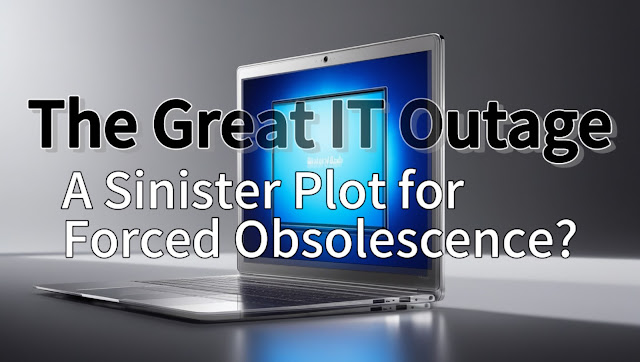- Get link
- X
- Other Apps
- Get link
- X
- Other Apps
In July 2024, the world experienced a significant IT outage that disrupted critical services across multiple sectors, including aviation, banking, and media. As systems went down and chaos ensued, a troubling question emerged: Was this merely a technical failure, or could it be part of a more sinister plan to push users toward upgrading their aging systems? The implications of this incident raise serious concerns about the ethics of technology companies and their strategies for managing obsolescence.
Background: The Outage That Shook the World
The recent global IT outage was triggered by a faulty update from CrowdStrike, a cybersecurity firm known for its Falcon platform. This update, intended to bolster security, instead caused widespread failures, particularly among Windows systems. Users reported encountering the infamous "Blue Screen of Death," rendering their machines inoperable and leading to significant disruptions.
The impact was immediate and far-reaching. Major airlines experienced grounding of flights, banking transactions were halted, and media outlets struggled to deliver timely news. The scale of the disruption was unprecedented, leaving many to question the reliability of their technology and the companies behind it.
The Effects of the Outage
In the aftermath of the outage, organizations scrambled to restore normal operations. The chaos created a palpable sense of urgency among users to consider upgrading their systems. Many began to feel that their older machines were no longer reliable, prompting discussions about the necessity of upgrading to newer versions of Windows.
This sense of urgency is where the theory of forced obsolescence comes into play. When critical systems fail, it creates psychological pressure on users to adopt the latest technology. The idea is that if your current system can’t handle the demands of today’s software, upgrading becomes the only viable option.
The Disruption: A Deeper Look
The broader implications of this outage extend beyond immediate technical failures. When a significant disruption occurs, it can erode trust in existing systems. Users may begin to question the reliability of their current technology and feel compelled to invest in new hardware and software.
Moreover, the psychological impact of such outages cannot be underestimated. Users may perceive that upgrading is the only way to avoid future disruptions. This mindset can lead to a cycle of continuous upgrades, where individuals and organizations feel trapped in a system of perpetual consumption.
The Theory of Intentionality
Could this outage be part of a more sinister plan? The idea that technology companies might intentionally create scenarios that render older systems obsolete is not without precedent. Historically, there have been accusations against various tech firms for engaging in planned obsolescence—designing products with limited lifespans to drive sales of new models.
The timing of the outage, coupled with the rapid push for users to upgrade, raises eyebrows. Is it possible that this disruption was a calculated move to make users feel that upgrading is not just beneficial but necessary? The tech industry thrives on innovation, but it also benefits from a consumer base that feels pressured to keep up with the latest advancements.
Implications for Users
For everyday users, the implications of such a scenario are significant. Forced upgrades can lead to increased costs, as consumers are compelled to purchase new hardware and software. This cycle of consumption not only strains personal finances but also contributes to a growing problem of electronic waste.
As older devices are discarded in favor of the latest models, environmental concerns come to the forefront. The tech industry must grapple with the sustainability of its practices, especially as consumers become more aware of the ecological impact of their choices.
A Call for Awareness
As we reflect on the recent global IT outage, it’s essential to consider the broader implications of such events. While technical failures can happen, the possibility of intentionality behind these disruptions warrants scrutiny. The theory of forced obsolescence raises critical questions about the ethics of technology and the responsibilities of companies to their users.
In a world increasingly reliant on technology, users must remain vigilant and informed. As we navigate the complexities of modern computing, we should question the motives behind upgrades and advocate for transparency in the tech industry.

Comments
Post a Comment